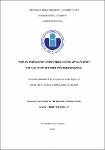| dc.description.abstract | If there is one thing that is going to change in 2021, it is the way people date.
The Covid-19 pandemic forced people to stay indoors, which has made it impossible
for many people to meet face-to-face, so they choose to date online. Dating apps now
are numerous on the market, one such application is Tinder, the most famous name
that dominates the world of online dating. Despite being as addictive as other social
networking platforms, a lot of Tinder users choose to stop using after a time of
experiencing it. The research purpose is to give the answer to the question of “Why
people quitting Tinder?” besides success stories with happy endings. To achieve
that, this paper is about to investigate and make a clearer view of the three factors
that can affect Tinder users' intention to stop using the application: the users’
Attitudes towards Tinder after using it, the influence from surrounding people, and
Users’ moral principles. The study is conducted by applying the Theory of Reasoned
Action and Moral Framework Theory. The number of 334 responses was collected
by online survey. The data was analyzed in the quantitative method using Partial
Least Squares Structural Equation Modeling (PLS-SEM) to illustrate the research
construct and hypothesis. Study findings reveal that the significant effect from
Attitudes towards Tinder through Users’ Perceiving leads to the Willingness to stop
using Tinder behavior; also illustrate the impact of Moral Principles to Stop using
Tinder Intention. Besides, the result pointed out that the Subjective Norms have no
effect on the Willingness to stop using Tinder behavior, and Users’ Expectation only
explains why people using Tinder, but cannot explain the reasons they quit using
the app. This study makes its contribution and recommendations to Tinder in
improving effective promotion campaigns for their dating application and
simultaneously provides some implications that may help to change the way people
see Tinder.
Keywords: Tinder, User's Perceiving, Motivation/ Expectation to Tinder, Attitudes
towards Tinder, Subjective Norms, Willingness to stop using Tinder behavior, the
Theory of Reasoned Action (Fishbein and Ajzen, 1980), and Moral Framework
Theory. | en_US |


